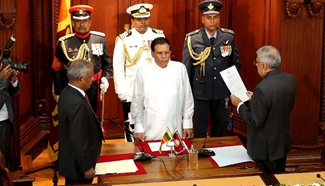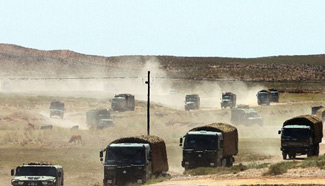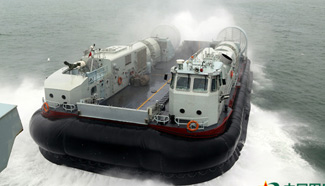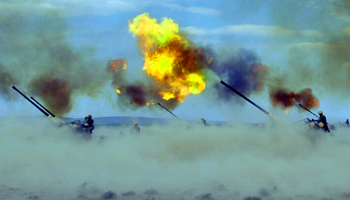Drills 'defensive in nature,' no intention to challenge third party: expert
The Chinese and Russian navies are set to hold one of their largest joint exercises on Thursday.
The drills, code-named Joint Sea 2015 II, will take place from Thursday to August 28 in the Sea of Japan, Peter the Great Gulf, the sea's largest gulf, and in waters off Clerk Cape.
Dispelling speculation from the Western media, analysts said the exercises are defensive in nature and that military cooperation between China and Russia does not intend to challenge the regional status-quo.
A key purpose of the drills is to "further enhance their capabilities of jointly coping with maritime security threats," China's defense ministry spokesperson Yang Yujun said in July.
Earlier reports said the two navies will join forces to simulate anti-submarine combat, air defense and other relevant missions. A joint beach landing of troops, a first for a Sino-Russian joint exercise, is also planned.
The two countries will also conduct joint search and rescue missions to free hijacked ships, a regular mission in past drills, Zhang Junshe, a researcher at the Navy Military Academic Research Institute, told the Global Times.
Irrelevant to status-quo
The Xinhua News Agency quoted sources close to the operation as saying that the drills "are not targeted at any third party and are not relevant to regional status-quo."
"The joint naval exercises between China and Russia are defensive in nature. The drills are not aimed at challenging the US-Japan Alliance in East Asia. They are very much acts of defense in response to the changing regional situation and the transitioning global order," Yang Cheng, a professor of Russian Studies at the East China Normal University, told the Global Times.
China and Russia have been holding annual naval drills since 2012.
The joint drill conducted in the Mediterranean Sea in May, dubbed Joint Sea 2015 I, was China's farthest ever naval exercise from its home waters.
The joint drills have been interpreted by some as a signal of intensified cooperation between Beijing and Moscow in the military sphere.
But Wu Dahui, a professor of international relations at Tsinghua University, said the security aspect of Sino-Russian relations has not changed in nature.
"Ever since the Ukraine Crisis broke out, the West has been saying that Russia and China are growing closer. It is true that there have been substantial improvements in terms of the economy, especially the energy sector. But in terms of security, the very nature of Sino-Russian relations, a strategic and cooperative partnership, has not changed," Wu told the Global Times.
Japan agitated
The drills may have agitated Japan as Japan's maritime self-defense force allegedly dispatched planes and vessels to film the Chinese warships as they passed through the Tsushima Strait heading to Peter the Great Gulf on Monday.
Wang Shaopu, a scholar of Japanese Studies at Shanghai Jiao Tong University, said Japan's vigilance over the joint exercises stems from its belief that the security of East Asia should be led by the U.S.-Japan Alliance.
He added that this belief is based on a Cold-War mentality and regional security should be built on multilateral cooperation, rather than on military alliance.
The two Joint Sea-2015 drills also coincide with Russia's parade in commemoration of the defeat of Nazi Germany on May 9 and China's military parade to mark the 70th anniversary of the victory of War of Resistance against Japanese Aggression (1937-45) on September 3.
Dispelling speculation that the drills are to show military prowess, Zhang said the naval exercises have no direct links to the parades.
According to Xinhua, six ship-borne helicopters, five fixed-wing aircraft, 21 units of amphibious equipment and 200 marines will also join the exercises from the Chinese side.
The Russian navy will send 16 surface ships, two submarines, nine units of amphibious equipment and 200 marines to participate in the drills.










